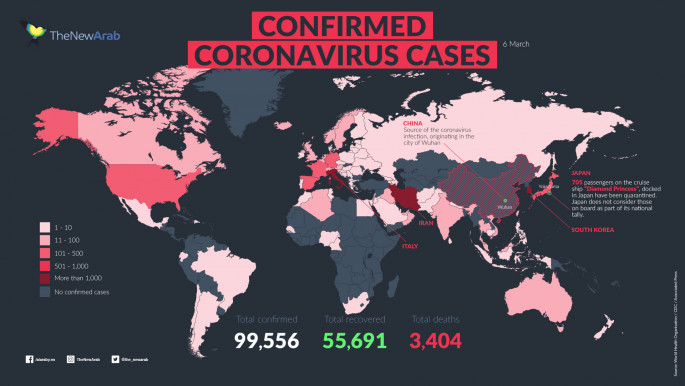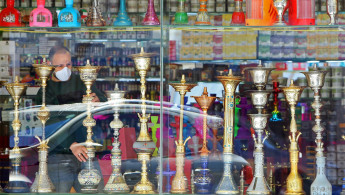A tale of two outbreaks: How Gulf countries succeeded where Iran failed on containing coronavirus
This however stands in sharp contrast to how the regime in Iran has handled the public health crisis.
At the start of the outbreak in his country, Iran's Foreign Minister Zarif even joked with his Austrian counterpart that he had not brought the virus to Vienna, seemingly making light of the epidemic.
Fast forward two weeks and Iran is now in crisis mode with nearly 5,000 contracting coronavirus and 124 dead at the time of writing.
Iranian troops have been deployed to the streets in a bid to tackle the virus, which is particularly fatal to the elderly.
Among those taken ill have been at least 23 MPs, a vice-president, the deputy health minister, and the head of the coronavirus task force, the average age of most of whom seems to reflect Iran's ageing government.
The disease has also cost the life of Mohammad Miramohammadi, a 71-year-old adviser of Supreme Leader Ayatollah Ali Khamanei and a former ambassador to Syria.
Such is the global concern about the Islamic Republic as a new vector for the virus, that China on Tuesday sent a plane to Iran to evacuate its citizens.
On Thursday, the government finally stepped up its response, cancelling schools and universities, imposed travel restriction and urged Iranians to avoid using banknotes in a bid to prevent its spread.
The World Health Organisation on Thursday told The New Arab that a team is in Iran identifying at-risk groups and advising on a response to the crisis.
"Two days into COVID-19 mission to Iran, WHO experts visited designated health facility and (were) impressed by quality of care, infection prevention and control measures, dedication of health staff, and community mobilisation efforts to raise public awareness about the disease," a WHO spokesperson told The New Arab.
"The WHO is working closely with health authorities to scale up capacities. One of the team's objectives is to support scaling up of contact tracing, early isolation, training health workers in provinces to manage cases, and coordination efforts to ensure a more effective response."
 |
Across the waters of the Gulf, there have been no recorded deaths from coronavirus among Gulf Cooperation Council (GCC) members who appear to have the crisis under control |  |
Swift response
Coronavirus' rapid spread and the refusal of authorities to take swift action – such as closing religious shrines – have shown that despite for all its talk of technology and science, Iran's elderly ruling elite is still ridden by inertia.
Across the waters of the Gulf, there have been no recorded deaths from coronavirus among Gulf Cooperation Council (GCC) members who appear to have the crisis under control through educating the public and taking radical measures to prevent the spread of corona.
With modern infrastructure, tech-centred governments and a strong financial backing, Gulf states say they are now seeing the number of new cases of coronavirus dropping significantly, as the problem grows elsewhere in the world.
The WHO says meanwhile that joint external evaluation missions in GCC countries in recent years have been generally "quite high".
"Multi-sectorial coordination is ongoing in handling public health outbreaks of international concern and in ensuring one vision to prevent, contain and respond to outbreak," the WHO said.
Public events in GCC countries have been cancelled, intensive screening enacted at airports, and thousands quarantined to ensure that coronavirus does not circulate in Gulf countries.
In the UAE, schools, universities and nurseries have been closed for at least a month, as a deep clean is implemented.
Qatar and other Gulf countries have chartered flights to Iran to evacuate their citizens, and kept those suspected of carrying the disease in specially designated hotels under medical supervision.
Almost all major public events in Gulf states have been cancelled, including national day celebrations in Kuwait.
Saudi Arabia has suspended Umrah pilgrimages for citizens and expatriates, while a deep clean has been implemented at holy sites in Mecca. The future of this year's Hajj pilgrimage is also in question.
Oman with a population of just 4 million, has quarantined more than 2,300 people, the vast majority staying at home in self-isolation, which if violated is now a criminal offence.
"It is important to stress that all cases have links to Iran and we still think there is no virus circulating inside Oman and that is a very important distinction," Professor Eskild Petersen, an expert of infectious disease told Oman Observer on Wednesday.
At the time of writing, Kuwait had 56 cases of coronavirus, Bahrain 52, the UAE 28, Oman 15, Qatar 8 and Saudi Arabia 2.
 |
It may be that a common challenge makes policymakers realise the need for solutions that cross borders – and that includes geopolitical rivals, including with Iran – need to be set aside – Kristian Ulrichsen |
 |
"We have seen some of the most proactive measures being taken across Gulf states to try and limit the spread of the coronavirus, and they have been ahead of the curve in cancelling or postponing major events," Kristian Ulrichsen from Rice University's Baker Institute told The New Arab.
"This reflects the concerns policymakers clearly feel about the risk they face of being at an economic, religious and social crossroads with such large flows of people."
Convergence
Gulf states have taken advantage of their location nestled between Europe, Asia and Africa and positioned themselves as hubs for international air travel.
Dubai is one of the five busiest airports in the world, while Doha, Abu Dhabi and Muscat have all built new airports to take advantage of the traffic between continents.
Ports have been expanded to make the Gulf region a logistical hub for the region, but this interconnectivity brings new challenges with the spread of disease – as coronavirus has highlighted.
"I think that the leaders in the Gulf states have realised that they have to respond quickly to a crisis on global magnitude and that hyper-globalisation we have seen in the Gulf over the past 15 years makes them specially vulnerable to the virus," Ulrichsen added.
"There may well be lessons learned about the risks of such interconnectivity, but for the moment the emphasis is on containment."
Regional efforts to combat the disease should have offered a prime opportunity for a review of the Gulf crisis – which seen Qatar blockade by Saudi Arabia, the UAE and Bahrain for more than two years.
Hopes were dampened when Qatar's health minister was denied entry to Saudi Arabia for a GCC meeting on coronavirus last month.
 |
One Saudi writer accused Qatar of inventing the disease to ruin the Expo 2020 in Dubai and Saudi Arabia's Vision 2030, although she has since alleged the comment was a satirical jab at the rival Gulf state.
Others in the Gulf have used the opportunity to disseminate anti-Shia and anti-Iran messages on social media, due to the prevalence of the disease in religious cities such as Qom.
One Saudi public figure equated the kingdom's only coronavirus sufferer with the Islamic State group due to the patient's previous trip to Iran, where they likely contracted the disease.
The inability of certain Gulf states to act in unison has led many to worry that the coronavirus crisis is not yet contained.
"This suggests that the Gulf standoff is continuing to hamper a coordinated response, which is needed more than ever," Ulrichsen said.
"It may be that a common challenge makes policymakers realise the need for solutions that cross borders – and that includes geopolitical rivals, including with Iran – need to be set aside."
Economic cost
Despite this, the UAE has helped facilitate a dispatch of 7.5 tonnes of WHO medical aid to Iran in a bid to tackle coronavirus, where the outbreak has become a regional issue.
Bill Law, editor-in-chief at The Arab Digest, said that the effective handling of the coronavirus crisis in the Gulf highlights some of the positives and negatives of their government structures.
"I think they have handled it well given their proximity to Iran," Law told The New Arab.
"What assists them in efforts at containment is the authoritarian structure of government which allows for speedy implementation and well-funded healthcare systems that should ensure decisions are appropriately carried out."
Despite the apparent success in containing the virus, the cost on Gulf economies will likely be huge.
Suspended flights to coronavirus virus-hit countries – such as Iran – and a decrease in demand will cost airlines worldwide $30 billion.
 |
The biggest concern in the UAE is that the massively hyped World Expo 2020, which begins in October, could be cancelled if the outbreak continues |  |
"The economic impact will be big. It already is with the Saudis temporarily suspending Umrah pilgrimages with a huge drive Saudi Arabia to increase both religious and other tourism. The longer this goes on the bigger the hit," he said.
The biggest concern in the UAE is that the massively hyped World Expo 2020, which begins in October, could be cancelled if the outbreak continues.
"The cancellation of Expo 2020 will hurt the UAE. Other countries like Bahrain and Oman are being stung by the drop in oil prices," Law added.
"Before COVID-19 hit the Gulf the economic situation was not very promising. Coronavirus in the short term will cause further difficulties."
With public events cancelled, business activity slowing and global demand for oil slumping, Gulf states could be hit hard economically by coronavirus, particularly if oil producing states can't agree on cuts.
Yet the ability of Gulf states to respond to the outbreak of the virus could preserve some of the confidence in the region remaining a major global logistics hub.
Paul McLoughlin is a news editor at The New Arab.
Follow him on Twitter: @PaullMcLoughlin



